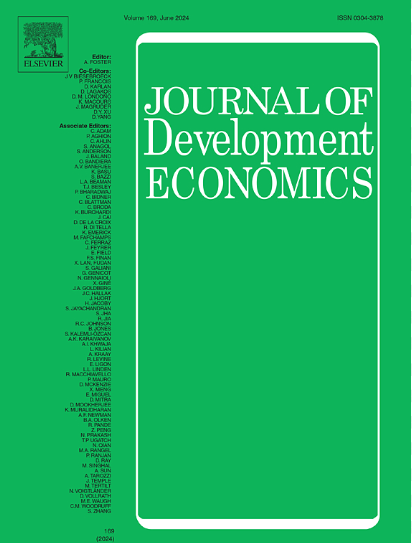The unintended consequences of trade protection on the environment
IF 4.6
1区 经济学
Q1 ECONOMICS
引用次数: 0
Abstract
Using the 2018–2019 US–China trade war as a quasi-natural experiment, we analyze how rising trade barriers undermine environmental regulation in China through political incentives. Through a difference-in-differences strategy exploiting variation in Chinese prefecture-level exposure to US tariffs, we find more exposed areas significantly reduce environmental regulation emphasis and raise pollution limits. This response operates through political incentives: connected Chinese officials more readily relax standards, and those who do gain higher promotion probability in exposed areas. Using satellite data and instrumental variables, we show this deregulation increased CO emissions in China. While finding no significant effects on aggregate economic activity, firm-level analysis reveals environmental deregulation helped sustain production and employment, but only in prefectures implementing substantial regulatory changes. Our results provide first evidence that protectionist policies targeting countries with weak environmental institutions may trigger a “race to the bottom” in regulatory standards.
贸易保护对环境的意外后果
以2018-2019年的中美贸易战为准自然实验,我们分析了不断上升的贸易壁垒如何通过政治激励破坏中国的环境监管。通过利用中国地级市受美国关税影响程度差异的差异中之差策略,我们发现受影响程度较高的地区显著降低了环境监管重点,提高了污染限制。这种反应是通过政治激励来运作的:有关系的中国官员更容易放松标准,而那些放松标准的官员在暴露领域获得更高的晋升可能性。利用卫星数据和工具变量,我们发现放松管制增加了中国的二氧化碳排放量。虽然没有发现对总体经济活动的显著影响,但公司层面的分析表明,放松环境管制有助于维持生产和就业,但仅在实施重大监管改革的县。我们的研究结果首次证明,针对环境制度薄弱国家的保护主义政策可能会引发监管标准的“逐底竞争”。
本文章由计算机程序翻译,如有差异,请以英文原文为准。
求助全文
约1分钟内获得全文
求助全文
来源期刊

Journal of Development Economics
ECONOMICS-
CiteScore
8.30
自引率
4.00%
发文量
126
审稿时长
72 days
期刊介绍:
The Journal of Development Economics publishes papers relating to all aspects of economic development - from immediate policy concerns to structural problems of underdevelopment. The emphasis is on quantitative or analytical work, which is relevant as well as intellectually stimulating.
 求助内容:
求助内容: 应助结果提醒方式:
应助结果提醒方式:


